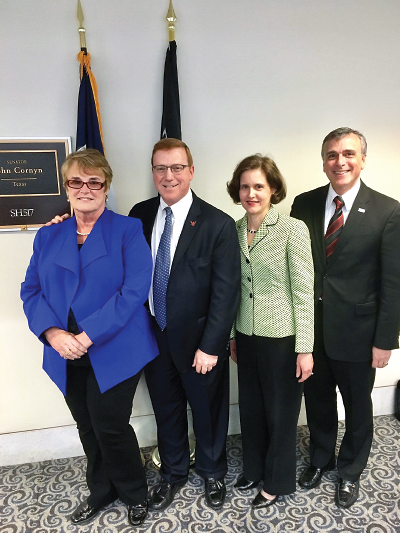Levin Meets With Congressional Leaders About Fate of Affordable Care Act
Abstract
Levin reminds lawmakers who seek to restructure Medicaid that it serves the most vulnerable people with mental illness and should be protected against proposals that would reduce access to mental health services.
Mental health parity and protections for those with serious mental illness must be preserved in any repeal, repair, or replacement of the Affordable Care Act (ACA).

APA CEO and Medical Director Saul Levin, M.D., M.P.A. (far end of table, left), reminds staff of Republican leaders in Congress that changes to Medicaid would have a harmful impact on many individuals with severe and persistent mental illness.
That’s the message that APA CEO and Medical Director Saul Levin, M.D., M.P.A., brought to Capitol Hill last month in meetings with top congressional leaders in the House and Senate contemplating changes to or elimination of the Affordable Care Act. The new administration and leaders of the Republican majorities in the House and Senate have committed to either change the ACA or repeal it altogether.
Levin met with staff members of Sen. John Cornyn (R-Texas), House Speaker Paul Ryan (R-Wis.), and House Majority Leader Kevin McCarthy (R-Calif.) to express concerns over access to mental health services under any plan impacting the ACA.
“I urged the Senate and House leaders not to erase the gains we have achieved through comprehensive mental health reform, which was passed in both houses with bipartisan support, and our years of effort to achieve parity and to advocate for its enforcement,” Levin told Psychiatric News.
Levin was joined at the meetings by Mary Giliberti, J.D., chief executive officer of the National Alliance for Mental Illness (NAMI); Paul Gionfriddo, president and CEO of Mental Health America; and Cynthia D. Belar, Ph.D., interim chief executive officer of the American Psychological Association.
Ryan’s and McCarthy’s staffs told Levin and leaders of the other organizations that they hoped to have a “reconciliation” package outlining reforms to the ACA sometime this month. (Reconciliation is a special legislative process, not subject to filibuster, required for changes to law that affect budgetary outlays or revenue. After a reconciliation package is passed, both chambers must approve statutory language in a bill that could be subject to filibuster.)

From left: Meeting with congressional staff last month on mental health issues were Cynthia D. Belar, Ph.D., interim chief executive officer of the American Psychological Association; APA CEO and Medical Director Saul Levin, M.D., M.P.A.; Mary Giliberti, J.D., chief executive officer of the National Alliance for Mental Illness; and Paul Gionfriddo, president and CEO of Mental Health America.
Staff members also said that they hoped to restructure Medicaid to lower costs while maintaining access to care. Levin cautioned, however, that changes to Medicaid will likely affect the most seriously mentally ill people.
“We expressed concerns over any efforts to reform Medicaid—including any efforts to restructure Medicaid into a block grant or per capita cap structure—which may harm those who need mental health and addiction services the most,” he said. “We also discussed workforce issues, emphasizing the shortage of psychiatrists and other mental health providers.”
They told lawmakers that the mental health community was eager and ready to be of assistance as Congress deliberates repeal, repair, or replacement of the ACA. “Our messages were well received, and the mental health community remained united in our messaging,” Levin said.
APA leaders and staff of the Division of Government Relations have emphasized to lawmakers that changes to the ACA are likely to have profound effects on people with mental illness. They have developed a resource document for discussions with congressional leaders outlining five key areas of the landmark ACA that have had the greatest impact on people with mental illness. These include the following:
Private insurance reforms: The law allows young people to remain on their parents’ insurance coverage until age 26. Since passage of the ACA, mental health treatment has increased by 5.3 percentage points among people aged 18 to 25; mental health uninsured visits declined by 12.4 percentage points, while private insurance visits increased by 12.9 percentage points. Critically, under the ACA, insurance plans cannot deny individuals coverage or charge more due to a preexisting health condition. Mental illnesses, including substance use disorders, are covered under this provision.
Medicaid expansion: The ACA allowed states the option of expanding Medicaid to include those earning 133 percent of the federal poverty level. Among the 5.3 million Medicaid expansion-eligible individuals with a mental illness/substance use disorder, over 50 percent have already gained access to coverage under Medicaid expansion initiatives nationwide. Several states that expanded Medicaid reported that they anticipated reductions in general funds needed for treatment of the uninsured, ranging from $7 million to $190 million in 2015. Since Medicaid expansion, 1.6 million Americans have gained access to substance abuse treatment, which has been critical as states seek to combat the opioid abuse epidemic.
Mental health parity: Predating the ACA, the 2008 Mental Health Parity and Addictional Equity Act (MHPAEA) requires parity in financial and treatment limitations in large group health plans and state and local government plans. This provides protections to an estimated 103 million people. The ACA further extended parity protections under MHPAEA to individuals covered by the Medicaid expansion and grandfathered individual and small group market plans. These plans cover 48 million people.
Essential health benefits and preventive care: Services to treat mental illness and substance use disorders are defined as an Essential Health Benefit that must be covered under insurance plans covered by the ACA. This means plans must cover preventive services, such as depression screening for adults and adolescents, behavioral assessments for children, alcohol use screening and counseling for adults, alcohol and drug use assessments for adolescents, tobacco use screening for adults, and cessation interventions for tobacco users.
Innovation funding to support integrated care: The ACA provides funding for states to design health homes to provide comprehensive care coordination for Medicaid beneficiaries with chronic conditions, including mental illnesses and substance use disorders. As of September 2016, 19 states and the District of Columbia had developed a total of 28 approved Medicaid health home models. ■
Psychiatric News will report on developments with regard to the ACA. APA members with questions about the ACA or possible changes to the law should contact Jeffrey Regan at [email protected].



